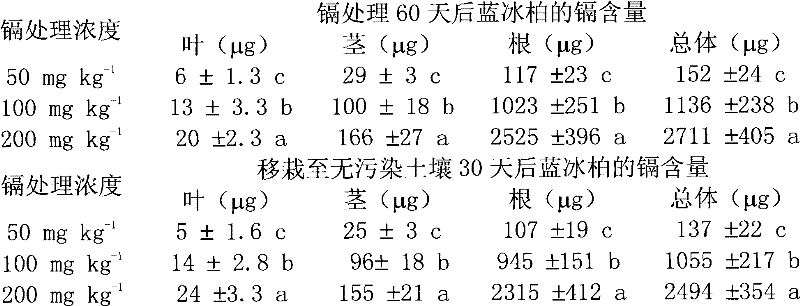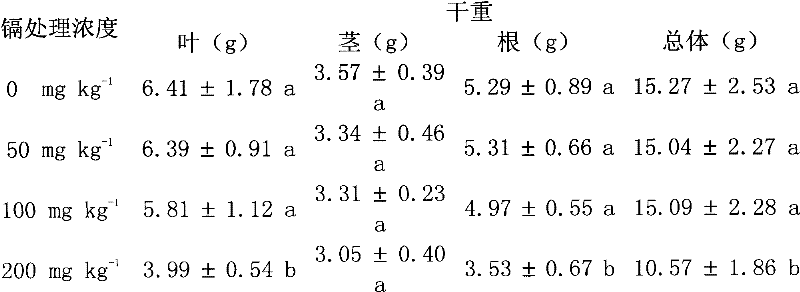Method for restoring cadmium contaminated soil by using cypress seedlings
A cadmium-contaminated soil and cadmium-contaminated technology, applied in the field of phytoremediation of environmental pollution, can solve problems such as long repair time, secondary pollution, and low repair efficiency, and achieve high repair efficiency, well-developed root system, and efficient absorption.
- Summary
- Abstract
- Description
- Claims
- Application Information
AI Technical Summary
Problems solved by technology
Method used
Image
Examples
Embodiment 1
[0018] Embodiment 1: (contrast test of different cadmium treatment concentration of blue ice cypress seedling potted plant)
[0019] (1) Test materials and scheme layout
[0020] 1. Test material
[0021] Soil: Coarse silty sandy soil collected from the tidal flats of Shangyu City, Zhejiang Province. Its basic physical and chemical properties are as follows: pH5.7, organic matter content 5.3g kg -1 , available phosphorus 3.4mg kg -1 , Alkaline nitrogen 45mg kg -1 , available potassium 67mg kg -1 , Cadmium was not detected (determined by atomic absorption instrument, American PE company).
[0022] Blue ice cypress: purchased from Xiaoshan Nursery District, Zhejiang Province.
[0023] 2. Pot experiment
[0024] Set up 4 cadmium concentration treatments for the potting soil for testing, 0mg kg respectively -1 , 50mg kg -1 , 100mg kg -1 , 200mg kg -1 , with CdCl 2 form to join. Among them, no cadmium (0mg kg -1 ) treatment was repeated 4 times, and the remaining 3 tre...
Embodiment 2
[0044] Embodiment 2: (contrast test of different cadmium treatment concentration of Cypress seedling potted plant)
[0045] (1) Test materials and scheme layout
[0046] Cypress seedlings were purchased from Xiaoshan Nursery District, Zhejiang Province;
[0047] All the other test materials, pot test, analytical method and data processing are the same as in Example 1;
[0048] (2) Test results
[0049] Table 3 dry weight of Cypress root, stem, leaf and whole plant (g / plant) for each treatment
[0050]
[0051] Different letters in the table represent significant difference (p<0.05)
[0052] It can be seen from Table 3 that the biomass of Cypress leaves and roots accounted for a large proportion in the whole plant, which were 45% and 37%, respectively, while the proportion of stems was relatively small. at 50 and 100 mg kg -1 Under the cadmium treatment, the dry weight of roots, stems and leaves of Cypress had no significant change compared with the control treatment (w...
Embodiment 3
[0059] Embodiment 3: (contrast test of different cadmium treatment concentrations of potted plants of oriental cypress seedlings)
[0060] (1) Test materials and scheme layout
[0061] Arborvitae seedlings were purchased from Xiaoshan Nursery District, Zhejiang Province;
[0062] All the other test materials, pot test, analytical method and data processing are the same as in Example 1;
[0063] (2) Test results
[0064] Table 5 Each treatment of Arborvitae root, stem, leaf and whole plant dry weight (g / plant)
[0065]
[0066] Different letters in the table represent significant difference (p<0.05)
[0067] It can be seen from Table 5 that the biomass of orientalis leaves accounted for a relatively large proportion of 55% in the whole plant, while the proportions of stems and roots were relatively small. at 50 and 100 mg kg -1 Under the cadmium treatment, the dry weight of the root, stem and leaf of orientalis had no significant change (p-1 Under the treatment of cadmi...
PUM
 Login to View More
Login to View More Abstract
Description
Claims
Application Information
 Login to View More
Login to View More - R&D
- Intellectual Property
- Life Sciences
- Materials
- Tech Scout
- Unparalleled Data Quality
- Higher Quality Content
- 60% Fewer Hallucinations
Browse by: Latest US Patents, China's latest patents, Technical Efficacy Thesaurus, Application Domain, Technology Topic, Popular Technical Reports.
© 2025 PatSnap. All rights reserved.Legal|Privacy policy|Modern Slavery Act Transparency Statement|Sitemap|About US| Contact US: help@patsnap.com



